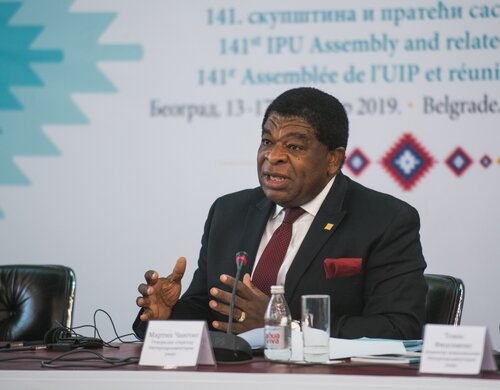New analysis for country teams: Perspectives of 52...
17 January 2020
A UHC2030 Partner Insight on universal health coverage (UHC) from the Inter-Parliamentary Union (IPU)

In October 2019, the Inter-Parliamentary Union (IPU) adopted a landmark resolution calling for parliaments to take all legal and policy measures to achieve universal health coverage (UHC) by 2030. The resolution urges parliaments to put in place effective UHC legislation to ensure that the right to health and medical care is guaranteed for all in law and in practice, without discrimination.
Mr. Martin Chungong, IPU Secretary General, stresses that with only 11 years left for the world to make good on its commitment to the 2030 global development agenda, this timely resolution is a roadmap for parliamentarians to make sure their governments are fulfilling their promises on UHC. He shares more about IPU’s perspective and role to achieve UHC.
“The Inter-Parliamentary Union is the global organization of parliaments and its mission is to empower parliaments and parliamentarians so that they can exercise their democratic mandate and make sure that the SDGs deliver for the people. Our health work is part of our programme that promotes parliamentary engagement with the global development agenda.
“We’ve been working on health for over ten years, looking at universality and focusing on people to make sure that they have access to services, can use them and benefit from them. At the beginning we focused on HIV/AIDS and women’s, children’s and adolescents’ health, in order to look at some of the more vulnerable groups who face barriers to accessing services. We considered how parliaments can deliver for them, and address some of these barriers, which can be legal, economic and cultural.
“The resolution that was adopted in October looks at UHC and the right to health. This is the first global parliamentary resolution on UHC and is a big achievement. It came just after the Political Declaration of the UN High-Level Meeting on UHC. It outlines key actions that parliamentarians can take on UHC, and it therefore strengthens the goals of the Political Declaration.
“This is the political part of our work, to give a push for UHC and put it high on the agenda of parliaments. We promote the implementation of this resolution by working with international partners, including WHO, PMNCH, Global Fund, UNAIDS, and we have an advisory group on health at the IPU, which is a small group of parliamentarians from all global regions who are leaders in their parliaments on health-related issues.
“The Advisory Group has taken on the role of following up on this resolution. We have developed an accountability framework to follow up on how parliaments implement the IPU resolution, identify what they are doing on UHC, what challenges they face, and how different partners can support them. This goes to the national level.
“We provide assistance to national parliaments in different areas including health, and we will work with partners to strengthen parliamentary institutions and build the capacities of parliaments to ensure they have the means to deliver on UHC.
“The regulatory and legislative environment is key to UHC and parliaments are a major actor in this respect. It is complex and technical and this is why parliamentarians in this area need further guidance and technical support. We often see misconceptions on what UHC is, what it means and what it implies in terms of legislation.
“We are also involved in a new initiative with the UHC Legal Solutions Network which we launched at the UN General Assembly with Georgetown University, WHO, UNAIDS, and UNDP. We are at the beginning but we are aiming to provide the necessary tools on the legislative environment to different audiences, including parliaments, governments, and civil society. This is a key area, and an area where more work needs to be done and capacities need to be strengthened.
“IPU has now signed the Global Compact on progress towards UHC and is a UHC2030 member. This action comes from and was endorsed by our members. Engaging on UHC requires this kind of UHC2030 platform where different partners and stakeholders come together because it is the only way that something can be achieved in this area. Parliaments are a key actor but they cannot achieve it alone. It is important to be part of this platform. At the global level, the exchange among different actors in countries and regions can bring different solutions and ideas. We really see it as very beneficial and necessary to be part of UHC2030.”
